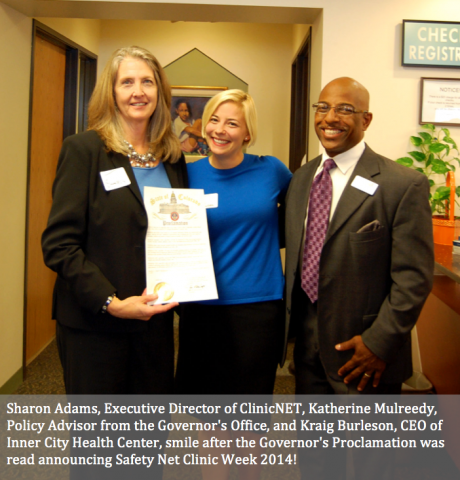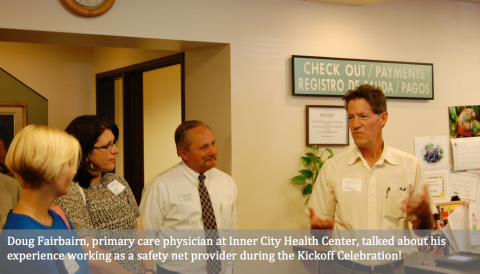by Tom Crowe, Safety Net Clinic Week Project Coordinator, ClinicNET
Safety Net Clinic Week 2014 Kickoff Celebration on Friday, August 15th at Inner City Health Center was a great success!
So, What Exactly is Safety Net Clinic Week?
Safety Net Clinic Week, co-sponsored by ClinicNET and the Colorado Rural Health Center, is a week-long advocacy and awareness event for Community Safety Net Clinics (CSNCs) and federally designated Rural Health Clinics (RHCs) throughout the State of Colorado. The goal of Safety Net Clinic Week is to build relationships between Colorado decision-makers and this often underrepresented, yet vital part, of the healthcare safety net.

We coordinate Safety Net Clinic Week by inviting elected officials, candidates for office, and community leaders into the clinics so that they can see first-hand the important work the clinics do for their communities. This year, we have over thirty individual site-visits from elected officials and candidates for office scheduled during Safety Net Clinic Week 2014!
What are Community Safety Net Clinics and federally designated Rural Health Clinics?
CSNCs are very diverse in their models: they include free clinics (predominately faith-based), community clinics (including school-based health clinics and mobile units), hospital residency clinics, and some private practice providers. Many of the CSNCs fund their operations through grants, patient revenue, and/or in-kind donations. Many rely on volunteer providers and support staff for daily operations and patient services.
RHCs are federally designated clinics located in a non-urban health care professional shortage area. RHCs may be public or private, for-profit or not-for-profit entity, and are certified as provider-based or independent (free-standing).
CSNCs and RHCs differ from Community Health Centers (sometimes referred to as Federally Qualified Health Centers) in that they receive little to no federal funding. This unique status is a blessing and a curse: while their operational budgets may be more volatile and uncertain, they have greater independence and leeway to explore models specific to their communities.
Changes in Healthcare in Colorado
One of the biggest changes in healthcare in Colorado is that more Coloradans have health insurance. Because of Medicaid expansion and Connect for Health Colorado, the statewide health insurance marketplace, the total number of uninsured has dropped from 17.0% in 2013, to 11.0% mid-way through 2014. While the hope is that all the newly insured will have access to healthcare, we know that access to care for vulnerable populations is a profound challenge still not yet adequately addressed by the ACA.

CSNCs and RHCs are Here for Access
While much is still uncertain on how healthcare reform will play out in Colorado and how it will affect CSNCs and RHCs, we know that CSNCs and RHCs will continue to be there for the most vulnerable populations. One of the gaps that CSNCs and RHCs are continuing to fill is the newly enrolled Medicaid population. Many traditional private practice providers are accepting very few or no Medicaid patients because of the low reimbursement rates. CSNCs and RHCs are there to help serve the 158,521 Coloradans newly enrolled in Medicaid.
CSNCs and RHCs United by a Common Goal
CSNCs and RHCs believe that all Coloradans deserve affordable, patient-centered healthcare, regardless of insurance status and ability to pay. This principle has been and will continue to be the driving force into the uncertain, yet hopeful future of healthcare in Colorado. Safety Net Clinic Week is about celebrating and honoring these clinics. Please join us in celebrating Safety Net Clinic Week 2014
If you have any questions regarding Safety Net Clinic Week 2014 please contact Thomas Crowe, the Safety Net Clinic Week 2014 Coordinator at thomas.crowe@clinicnet.org or (720)-863-7805.
